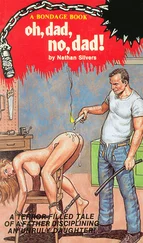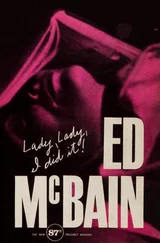The pale-eyed, bearded boy was watching him. His arms were still folded across his chest. He leaned against the back wall, his head slightly tilted, light streaming through the long windows to burnish the beard and mustache. Long hair and skeptical eyes. Faint look of derision. A look he had seen often enough on the face of — well, his own daughter. Well, all right, I’m saying all the wrong things, he thought, they shouldn’t have asked me to make this speech, anyway, I’m not a public speaker, I don’t now how to do such things. The Kreugers shouldn’t have asked me to talk about Scarlett as though she were my... own daughter. He looked again at the pale, blue-eyed bearded boy at the back of the room. My own daughter, he thought. Arms folded, cold dead eyes, watching, challenging.
“There was a little thing I used to do whenever Scarlett came to the house,” Jamie said. “Not recently. My daughter and Scarlett haven’t seen too much of each other in recent months. I mean when Scarlett was younger, sixteen, seventeen. Whenever she came to the house, I used to say ‘Oh, lookee heah, it’s Missy Scah-lutt home fum Atlanta!’ and she’d look at me and blink — I don’t know what she was thinking, her parents tell me now she used to get a kick out of it, but maybe she was thinking, Well, here’s this baffling little joke again from Lissie’s dumb father, I just don’t know. But the point, the thing I’m trying to say is, is... that was it, that was the extent of our communication. ‘Hello, Mr. Croft’ and ‘Oh, lookee heah, it’s Missy Scah-lutt home fum Atlanta!’ That was it, do you see? That was all of it. And I wish now just once I’d have said, ‘Hey, Scarlett, what’s new in your life, what’s important to you, what would you like to talk about?’ Just once. And I wish that just once Scarlett would have asked me why I had a worried look on my face, or why I, why I... you see, I think we could have talked. I think we could have prevented what happened. It’s too late now, I guess.”
The bearded boy against the wall was still watching him, his blue eyes unwavering, his arms still folded across his chest. It seemed to Jamie that he wanted something more from him.
“But maybe it isn’t too late for the rest of us,” Jamie said, and then nodded, and gave a small, embarrassed shrug, and turned to the minister where he was sitting with his prepared notes in his lap.
There was silence in the room.
Jamie sat down and the minister took his place behind the long table with the lilies on it. Jamie scarcely listened to what he was saying, but he knew the man was keeping his promise, toning down the Jesus stuff and expressing no official church condemnation of suicide. Jamie was thinking he’d made a complete fool of himself. He hadn’t even known the girl, they shouldn’t have asked him to say anything. In retrospect, Melanie had said it better anyway, had said in a single sentence everything he’d hoped to say today: We look ahead and try to rescue the future.
The bearded boy with the blue eyes was still standing at the back of the room when the Crofts left. He said nothing to Jamie as they passed him on their way out. In the car, when Jamie asked Connie whether it had been all right, she said, “Yes, fine, darling,” but he knew she was thinking he should have prepared a talk, the way the minister had.
He could never understand why he thought of New York City in medieval terms, as if it were cobblestoned and turreted when it was neither — well, yes, a vestigial cobble here and there. But Jamie saw it always as one of those magnificent old towns perched high above the Rhine or the Loire, commanding the surrounding countryside, a fortification to which the peasants could scurry whenever barbarian hordes threatened. The metaphor became strongest during the winter months, when grim gray armies attacked, crouching beyond the river-moats, laying icy siege.
In November, the faces became pinched and withdrawn. Men walked briskly, their unaccustomed overcoats bulky and cumbersome, one gloved hand clutching a dispatch case, the other thrust deep in a pocket. The Hare Krishna kids in their saffron robes and topknots walked Fifth Avenue indifferent to the wind, shaking their tambourines and chanting. Loonies of every persuasion bundled themselves in sweaters or shabby overcoats, carrying signs that promised doom or redemption. The bag ladies searched assiduously through the experimental concrete garbage bins on every corner, hampered by the intransparency of the new containers, wishing perhaps for the old wire-mesh types that had been too easy to steal in a city where stealing was almost an honest profession diligently pursued. The ladies were cold and unsmiling. They wore woolen gloves cut off at each of the fingers and thumbs.
Despite the cold, the three-card-monte sharks were busy at work, cruising the avenue with their folding stands, setting up shop on the windswept sidewalk, the shill watching the actor as he manipulated the cards on the table top, “Follow the red ace, man, just tell me wheah the red ace is, watch it now,” or swiftly moving the three whiskey bottle caps, “Where’s the pea, thass all you got to tell me, man. Pea’s under one of these heah caps, you see it now?”
The street musicians were out, too, discreetly plying their trade, their hand-lettered cardboard signs beseeching STRUGGLING THROUGH JUILLIARD or HELP ME MAKE BEAUTIFUL MUSIC, while behind the signs sat the supposedly embryo violinists or accordionists or — on the corner of Fifth and Fifty-sixth, outside the Hallmark store — a young blond girl playing a flute.
His heart stopped.
Her face came into his mind.
Everywhere around him, while the girl sitting cross-legged on the sidewalk played her flute and the silvery notes splintered on the brittle air, the beautiful women of this city rushed past, gorgeous New York faces unlike any others in the world, gloved hands clutching the collars of cloth coats, mufflers trailing, long hair blowing in the wind, fast, moving fast, high heels clicking on the sidewalk, chin and nose and breasts and flashing instep cleaving the crystalline air, lovely — but none of them Joanna.
There was a telephone booth on the corner.
He realized with a start that he had forgotten her number.
The opera company had begun its fall season, he had seen their full-page ad in the New York Times several months back. But would she be rehearsing today? From past experience, he knew that her rehearsal schedule was erratic. She probably wouldn’t even remember him.
He looked up her number and dialed it.
He let it ring four times and was about to hang up when he heard her voice.
“Hello?”
She sounded as if she’d been sleeping. Jesus , he thought, I’ve woken her up.
“Joanna?” he said.
“Yes.”
“Jamie,” he said.
“Yes, Jamie, how are you?” she said.
“Jamie Croft,” he said, as though certain she had mistaken him for someone else.
“Yes, I know.”
“I didn’t wake you, did I?”
“Wake me? It’s almost twelve o’clock.”
“I know, but I thought... you sounded...”
“No, I was practicing. What is it, Jamie?”
“I... uh... was wondering how you’re doing.”
“Ah. Were you?”
“Yes.”
“I’m doing fine. How are you doing?”
“Fine.”
“Good.”
Silence. There hadn’t been anger in her voice, not quite, just an edge of... wariness? Distance? Indifference? The silence lengthened.
“What is it you want, Jamie?” she said.
“I thought... I thought I might like to see you.”
“Ah.”
“If you were free.”
“Ah.”
Читать дальше












